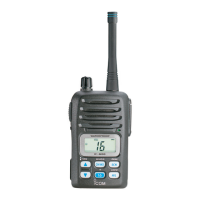R DANGER! NEVER short the terminals of the bat-
tery pack. Also, current may flow into metal objects such as
a key, so be careful when placing the battery packs (or the
transceiver) in bags, and so on. Simply carrying with or plac-
ing near metal objects such as a key, and so on, may cause
shorting. This may damage not only the battery pack, but also
the transceiver.
R DANGER! Use and charge only specified Icom bat-
tery packs with Icom transceivers or Icom chargers. Only
Icom battery packs are tested and approved for use with Icom
transceivers or charged with Icom chargers. Using third-party
or counterfeit battery packs or chargers may cause smoke,
fire, or cause the battery to burst.
R DANGER! NEVER operate the transceiver near
unshielded electrical blasting caps or in an explosive atmo-
sphere.
RWARNING! NEVER hold the transceiver so that
the antenna is closer than 2.5 cm (1 inch) from exposed parts
of the body, especially the face or eyes, while transmitting.
CAUTION: NEVER connect the transceiver to a power
source other than the products specified by Icom. Such a
connection will ruin the transceiver.
CAUTION: MAKE SURE the flexible antenna, bat-
tery pack and jack cover are securely attached to the trans-
ceiver, and that the antenna and battery pack are dry before
attachment. Exposing the inside of the transceiver to dust or
water will result in serious damage to the transceiver.
After exposure to water, clean the battery contacts thor-
oughly with fresh water and dry them completely to remove
any water or salt residue.
DO NOT place or leave the transceiver in direct sunlight
or in areas with temperatures below –20°C (–4°F) or above
+60°C (+140°F): Marine, below –30°C (–22°F) or above
+60°C (+140°F): LMR.
DO NOT use harsh solvents such as Benzine or alcohol
when cleaning, as they will damage the transceiver surfaces.
DO NOT push [PTT] when not actually intending to transmit.
DO NOT modify the transceiver. The transceiver warranty
does not cover any problems caused by unauthorized mod-
ification.
iv
PRECAUTIONS

